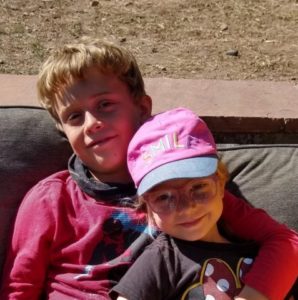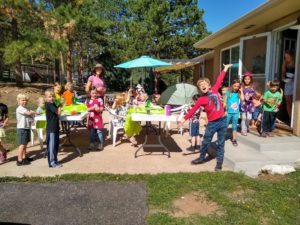
As we all prep for school-or-not, ’tis the season for Death by Appointment. The last few weeks have carted my kids to the dentist, the doctor, the counselor, the orthodonist, back to the dentist and doctor (four times, at least), and finally, the endodontist. I am now old enough to have a child who needs his wisdom teeth out.
As God continues to nudge me to not do for my kids what they can/should do for themselves, I had my 16-year-old fill out his own paperwork. But y’know, he’s the kind of kid that takes his own spin off, say, the boxes asking, “Are you pregnant?”
He opted for a write-in. It’s 2020.
As in, anything could happen.
A friend laughed to me about recently hearing a summer storm on its way. Could be thunder. But then again, it’s 2020. Could be Godzilla.
Indeed. Another friend says this is the first year she’s sewn more school supplies than she’s bought.
Personally, I entered the ranks of more personal loss this week from this pandemic, which I’ll be writing about soon. (I need to muscle through it on my own before I cast it to cyberspace.) It’s been a painful week, friends.
And like the rest of us, I wonder how a global pandemic will define this generation of kids: the anxiety. Virtualization. Sanitization. Lack of socialization.
But this is what I’ve learned in dark days, days requiring me to hunt for treasure I know’s gotta be there. If I let them, these days can make my kids stronger, resilient fighters.
What made you resilient?
This is completely counterintuitive for the part of me that wants to be a snowplow mom, hauling every possible obstacle out of my kids’ path–ostensibly for the sake of their happiness.
I’m guessing your story can’t be that unlike mine. What’s made you strong? What’s made your marriage strong? What makes your family strong?
Yes, there are days of nurture, of sunny picnics and sugared birthday parties and nights reading together, kids piled on you like puppies.
But the strongest people, the most resilient kids, marriages, families? It’s people who’ve turned their obstacles into sheer muscle.
I think of my son’s childhood with ADHD, and then his cancer scare. I think of my daughter’s anxiety, my other son’s throbbing transition back to the U.S. from Africa, or all the friends he recently recounted losing to the transitory life of a third-culture kid.
Because our kids thrive in stability and structure and safety.
But they also grow hardy when removed from a greenhouse. Thrust into the elements.
5 Tips for Resilient Kids through COVID-19
Help them articulate losses.
It can be hard for kids to think of “loss” in terms of anything other than death. But yes, there’s a lot our kids have lost this year, even if no one has died.
Maybe it’s summer camp, or the chance to try out for cross-country, or seeing cousins. Maybe the lack of structure has them flirting a bit with depression, or they hear you and your spouse arguing late at night.
Pauline Boss writes in Ambiguous Loss: Learning to Live with Unresolved Grief,
Ambiguous loss makes us feel incompetent. It erodes our sense of mastery and destroys our belief in the world as a fair, orderly, and manageable place….
Most important, we must realize that the confusion we are experiencing is attributable to the ambiguity rather than something we did–or neglected to do. Once we know the source of our helplessness, we are free to begin the coping process. We assess the situation, begin revising our perceptions … We feel more in charge even though the ambiguity persists. (emphasis added)
So start the conversation–and continue it. What have you missed this year?
My kids were lamenting the loss of youth group summer activities a few nights ago. And weeks ago, my second son was discouraged his summer trip to see his grandparents and take his week-long culinary class, a birthday gift.
Take a bit of time just to recognize loss in all its forms and feel sad about it together. If you’re wondering if this is biblical, David in the Psalms was great at this. Jesus, too, openly laments in the Bible.
We can show our kids they can bring their worst-feeling emotions, not just the best, into our relationship with God–the full spectrum of what He created.
This develops resilient kids who fully face what’s wrong about this world rather than shellacking over it.
Differentiate between complaining/whining and authentic conversation.
Of course, it’s tough even as a parent. When, say, one’s child has rapped along to that song on the Hamilton soundtrack 46 times. In a row.
But what’s the difference between whining and honest expression? This post has a chart to help you differentiate. In a couple of words, complaining is more about a lack of belief (think the Israelites in the desert) and entitlement (“I deserve…”).
Healthy expression talks about what it would like with an open, non-demanding hand. It’s got an inner attitude of peace and trust.
So when my kids lean toward whining about non-existent extracurriculars, it’s a chance to hear their grief, but reroute it. You’re right. This is so frustrating. The anger you’re feeling is real. I do think this is bordering on complaining. Then, take them into the next two steps.
Diligently replace whining with gratitude.
Really, these two are opposites. One replaces the other.
And sure, refusing to complain is a good discipline for my mouth and my kids’. But to transform the disdain inside of me toward obstacles, I see God actually replacing my complaining by helping me see His goodness. And then worship Him for it.
So when a child’s not just being sad, but outright complaining about the lack of a birthday party, first, resonate. But then, You know, I’m so thankful we’ve had such great birthday parties before–and that you’re having another birthday. I’m so thankful you’re healthy and this thing is temporary.
Maybe this looks like
- straight-up regularly asking your kids around the dinner table or bedtime about what they’re thankful for right now, COVID or not. (You go first.)
- making a posterboard on the back of the door to scrawl out what you’re grateful for
- writing a thank-you note to someone who might not expect it
- recalling what developing-world nations are army-crawling through every day
- talking about good changes you’ve seen come out of this pandemic
- creating a gratitude paper chain
- letting kids write things they’re thankful for in dry-erase on a mirror, or chalk on the driveway
Resilient kids find Plan B.
I’ve written before about Brene Brown’s research that hope–that quality that makes resilient kids–is more than a feeling. Brown relates that hope is a scrappy plan B.
It’s the thing that lifts our heads–and I’ll add, to God’s possible Plan B.
So maybe the kid missing cross-country could organize a running club with buddies. Maybe the kid missing dance could take the online voice lessons she’s always wanted to try. Or the kid missing the birthday party plans something you’ve never even thought of trying before–with even more meaningful memories.
Celebrate the ways you see resilient kids.
My youngest son’s ADHD wasn’t diagnosed until two weeks ago–in part, I think, because his manifestations are completely different from his brother’s.
It took long months at home with him inciting arguments due to his lack of impulse control. Overreacting. Incessantly seeking stimulation. Crumbling without physical activity or structure.
COVID exposed some cracks in him. But it also exposed opportunities for him to mature.
So as I once again find myself developing a multi-pronged approach to these issues–I also find a kid who’s changing. It’s been a long summer, folks. But when his brothers demand something of him, for example, he’s learning to say, I can do that. But I’d like you to ask me in a more kind way.


Among all the losses? That’s a win. And he’s had a lot more–like how he shined in helping younger kids all on his own at last week’s Bible Block Party down the street.
(“And he’s a great breakdancer!” one mom added after letting me know he really was helpful.)
What if our kids’ losses defined them–only by the ways those losses made them strong?
What if our kids' losses defined them--only by the ways those losses made them strong? Click To Tweet
Like this post? You might like
Blind Wrestlers, Cancer, and How Your Child’s Pain Could be a Gift
Guest Post: Helping Our Kids Turn Suffering into Praise
Bouncing Back: Helping Your Child Open the Gift of Failure
When Your Child’s Weaknesses Feel Overwhelming












![Now You're Speaking My [Love] Language Now You're Speaking My [Love] Language](https://www.janelbreitenstein.com/wp-content/uploads/2015/08/love-languages-text-1.jpg)





August 19, 2020 at 7:20 pm
Love this. It aligns with part of a book I just started reading last night, The Coddling of the American Mind. Most hardships DO make us stronger!
August 19, 2020 at 7:30 pm
Kim, thanks so much for the warm words. I loved the original article version of that book as it appeared in the Atlantic, and it’s been very influential in how I raise my kids. Thanks for weighing in!